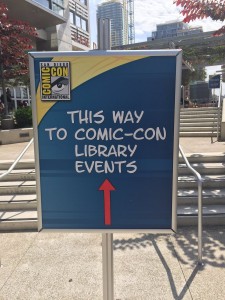 For the second year in a row, the San Diego Public Library hosted its free Comic Conference for Educators and Librarians in conjunction last month’s Comic Con International. CBLDF Editorial Director Betsy Gomez was there to moderate the panel on Equipping Teachers to Defend Comics, and we are overjoyed to see so many comics creators, publishers, and professional educators and librarians coming together to share innovative strategies for promoting and teaching comics!
For the second year in a row, the San Diego Public Library hosted its free Comic Conference for Educators and Librarians in conjunction last month’s Comic Con International. CBLDF Editorial Director Betsy Gomez was there to moderate the panel on Equipping Teachers to Defend Comics, and we are overjoyed to see so many comics creators, publishers, and professional educators and librarians coming together to share innovative strategies for promoting and teaching comics!
New York Public Library manager of school outreach Amie Wright, who participated in the panel Picture Books for Grown Ups: Why Graphic Novels Matter to Adults, wrote up her experience at the mini-con for American Libraries. A major theme that emerged throughout the five days of workshops and panels, she said, was how teachers and librarians can “move beyond excellent but well-known titles like Persepolis and Maus to include more diverse titles and ensure systematic buy-in with key stakeholders like principals and school board members.”
One important strategy to cultivate support for comics in schools, Wright and her co-panelists realize, is to make more adults–parents, teachers, librarians, and administrators–into comics readers, showing them the full depth and breadth of the format so that they’re more likely to give them the same consideration as any other book when a comic or graphic novel gets challenged.
During the panel moderated by Gomez, featuring Raina Telgemeier, Los Angeles Public Library’s Candice Mack, First Second’s Gina Gagliano, and David Saylor of Graphix, participants discussed how to anticipate book challenges with a robust collection development policy–in many cases heading them off before they start–and how to handle those that do go forward. CBLDF offers tips and links to resources for addressing challenges here, and for several of the most frequently challenged comics we’ve developed the Adding Graphic Novels to Your Library or Classroom Collection series which brings together reviews, praise, awards and other recognitions to provide a ready-made defense before a review committee or administrative board.
Another major theme of the mini-conference was the importance of diversifying collections and curricula to engage students and build empathy. This goal is advancing with help from Gene Luen Yang’s Reading Without Walls challenge, which began as his National Ambassador for Young People’s Literature platform but has recently been cemented as an ongoing annual program. Reading Without Walls challenges young readers to choose books about characters who don’t look or live like them; addressing topics they don’t know much about; or in a format they don’t usually read–such as a graphic novel, a book in verse, or an audiobook. Teachers, librarians and parents can find resources to supplement the initiative at the Reading Without Walls website.
Thanks to the San Diego Public Library and Comic Con International for spearheading this effort to bring more comics to more people, and to all the CCEL panelists and participants for making it a success! Check out Wright’s recap of the event here at American Libraries’ blog The Scoop.
Help support CBLDF’s important First Amendment work in 2017 by visiting the Rewards Zone, making a donation, or becoming a member of CBLDF!
Contributing Editor Maren Williams is a reference librarian who enjoys free speech and rescue dogs.